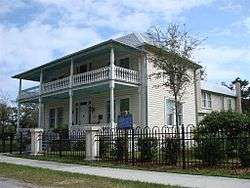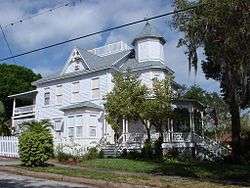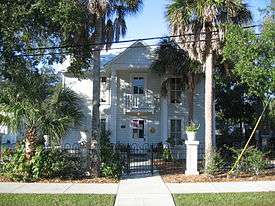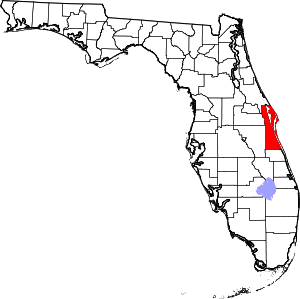Melbourne, Florida
Melbourne /ˈmɛlbərn/ is a city in Brevard County, Florida, United States. As of the 2010 census, there was a population of 76,068.[4] The municipality is the second-largest in the county by both size and population.[8] Melbourne is a principal city of the Palm Bay – Melbourne – Titusville, Florida Metropolitan Statistical Area. In 1969 the city was expanded by merging with nearby Eau Gallie.[9]
Melbourne, Florida | |
|---|---|
City | |
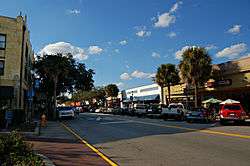 Downtown Melbourne in January 2009 | |
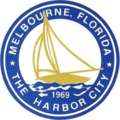 Seal  Wordmark | |
| Nickname(s): | |
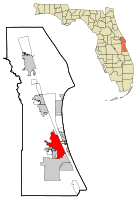 Location in Brevard County and the state of Florida | |
 Melbourne, Florida Location in the United States | |
| Coordinates: 28°7′N 80°38′W | |
| Country | United States |
| State | Florida |
| County | Brevard |
| Settled | c. 1867 |
| Incorporated (village) | December 22, 1888 |
| Consolidated with Eau Gallie | July 15, 1969 |
| Founded by | Cornthwaite John Hector |
| Named for | Melbourne, Australia |
| Government | |
| • Type | Council-Manager |
| • Mayor | Kathy Meehan |
| • City Manager | Mike McNees |
| Area | |
| • Total | 49.88 sq mi (129.20 km2) |
| • Land | 44.06 sq mi (114.12 km2) |
| • Water | 5.82 sq mi (15.07 km2) 14.4% |
| Elevation | 20 ft (6 m) |
| Population | |
| • Total | 76,068 |
| • Estimate (2019)[5] | 83,029 |
| • Density | 1,884.28/sq mi (727.53/km2) |
| Time zone | UTC−5 (EST) |
| • Summer (DST) | UTC−4 (EDT) |
| ZIP code | 32901, 32934, 32935, 32940, 32902, 32912, 32936, 32941, 32904 |
| Area code | 321 |
| FIPS code | 12-43975[6] |
| GNIS feature ID | 0294589[7] |
| Website | City of Melbourne |
History
Early human occupation
Evidence for the presence of Paleo-Indians in the Melbourne area during the late Pleistocene epoch was uncovered during the 1920s. C. P. Singleton, a Harvard University zoologist, discovered the bones of a mammoth (Mammuthus columbi) on his property along Crane Creek, 1.5 miles (2.4 km) from Melbourne, and brought in Amherst College paleontologist Frederick B. Loomis to excavate the skeleton. Loomis found a second elephant, with a "large rough flint instrument"[10] among fragments of the elephant's ribs. Loomis found in the same stratum mammoth, mastodon, horse, ground sloth, tapir, peccary, camel, and saber-tooth cat bones, all extinct in Florida since the end of the Pleistocene 10,000 years ago. At a nearby site a human rib and charcoal were found in association with Mylodon, Megalonyx, and Chlamytherium (ground sloth) teeth. A finely worked spear point found with these items may have been displaced from a later stratum. In 1925 attention shifted to the Melbourne golf course.
A crushed human skull with finger, arm, and leg bones was found in association with a horse tooth. A piece of ivory that appeared to have been modified by humans was found at the bottom of the stratum containing bones. Other finds included a spear point near a mastodon bone and a turtle-back scraper and blade found with bear, camel, mastodon, horse, and tapir bones.[11] Similar human remains, Pleistocene animals and Paleo-Indian artifacts were found in Vero Beach, 30 miles (48 km) south of Melbourne, and similar Paleo-Indian artifacts were found at the Helen Blazes archaeological site, 10 miles (16 km) southwest of Melbourne.
Settlement
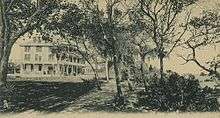
After the Civil War, pioneer families arrived, and Melbourne was founded in 1867.
The first settlers arrived after 1877. They included Richard W. Goode, his father John Goode, Cornthwaite John Hector, Captain Peter Wright, Balaam Allen, Wright Brothers, and Thomas Mason.[12] Three of these men, Wright, Allen, and Brothers were black freedmen.[13]
The city, formerly called "Crane Creek",[14] was named Melbourne in honor of its first postmaster, Cornthwaite John Hector, an Englishman who had spent much of his life in Melbourne, Victoria, Australia.[15] He is buried in the Melbourne Cemetery, along with many early residents in the area. The first school in Melbourne was built in 1883 and is on permanent exhibit on the campus of Florida Institute of Technology. By 1885, the town had 70 people.[16] The Greater Allen Chapel African Methodist Episcopal Church was founded in 1885 and is still active.[17]
In the late 1890s, the Brownlie-Maxwell Funeral Home opened and it is still in business. The oldest black-owned business in the county is Tucker's Cut-Rate plumbing. It opened in 1934.[18]
In the early 1900s, houses were often built in the frame vernacular style.[19]
In 1919, a fire destroyed most of the original downtown along Front Street. At the time, it was rebuilt west of US Hwy 1.[20][21]
During the Jim Crow years, black people were required to enter movie theaters via a different entrance from whites and sit in the balcony. Gas stations had signs for rest rooms labeled "Men", "Women", and "Colored." This persisted until integration in the late 1960s.[22]
In late 1942 the Naval Air Station Melbourne was established as a site to train newly commissioned Navy and Marine pilots for World War II. The program ran until 1946, and the land that was used for that program makes up most of what is currently the Orlando Melbourne International Airport.[23]
In 1969, the cities of Eau Gallie and Melbourne voted to merge, forming modern-day Melbourne.[9]
Postwar
In the 1950s, Babcock Street was extended north to intersect with US 1. The Melbourne Shopping Center was constructed on Babcock, the area's first strip mall. Consumers were sufficiently attracted to this new mall, that the traditional downtown, off New Haven, suffered. Urban blight was successfully attacked there in the 1980s.[24]
A board was created by the legislature to spend a 10% tax on electric bills. This was used by the Melbourne Civic Improvement Board to build the Melbourne Auditorium, the first library and fire station, and various parks. The board was dissolved when Melbourne was merged with Eau Gallie in 1969.[24] That merger doubled the size of Melbourne.[25]
Streetlights were gradually added until, by the early 1960s, streets east of Babcock Street had lights. Lights were added to streets west of Babcock after the early 1960s.[26]
In 1969, the city elected Julius Montgomery, its first black councilman. Montgomery was also the first African American student of Brevard Engineering College, later Florida Institute of Technology which named their Pioneer Award after him. Montgomery was also the first African American professional hired by NASA at the Kennedy Space Center in 1956. His accomplishments are recounted in the chapter "A Man of Firsts" in the book We Could Not Fail by Richard Paul and Steven Moss.[27][28]
On August 2, 1995, the city received a record 9.06 inches (230 mm) of rainfall from Hurricane Erin.[29]
During the week of August 22, 2008, a record 17.54 inches (446 mm) of rain fell caused by Tropical Storm Fay.[29]
A 2009 Halloween street party sponsored by a downtown restaurant attracted an estimated 8,000–10,000 people. This overwhelmed the downtown area. Street parties were curtailed until public safety issues were addressed.[30]
On February 18, 2017, president Donald J. Trump held his first post-inauguration rally at the Orlando-Melbourne International Airport drawing a crowd of 9,000.[31]
Geography
Melbourne is located approximately 60 miles (97 km) southeast of Orlando on the Space Coast, along Interstate 95. It is approximately midway between Jacksonville and Miami. According to the United States Census Bureau, the city has a total area of 39.6 square miles (102.5 km2), of which 33.9 square miles (87.7 km2) is land and 5.7 square miles (14.8 km2) (14.42%) is water.[32]
The east-west street named Brevard Drive was historically the "center" of town; with addresses called "north" and "south" of this street. The north-south Babcock Street provided the same centerline for "east" and "west" directions.
Melbourne Beachside has a small presence on the South Beaches barrier island. It is often confused with Melbourne Beach, a separate political entity.
Climate
Melbourne, Florida has a humid subtropical climate or Köppen climate classification Cfa – typical of the Gulf and South Atlantic states. Although Melbourne is classified as a Humid Subtropical climate (8 or more months with a mean temperature of 50 °F (10 °C) or higher), Melbourne is located far enough southward that it lies close to the broad transition zone from subtropical to tropical climates (all months have a mean temperature of 64.4 °F (18.0 °C) or higher). Melbourne averages 2,900 hours of sunshine annually. Melbourne has the typical two season climate commonly found in humid subtropical climates – a hot and wet season (late May through October) and the warm and dry season (November through April).
Melbourne averages 49 inches (1,200 mm) of rainfall annually, much of it coming in convective thunderstorms in the late May to early October time period. The record rainfall occurred on August 20, 2008, when Tropical Storm Fay dropped 18.21 inches (463 mm).[33] Melbourne can sometimes have moderate to severe drought conditions from late fall through spring, with brush fires occurring and water restrictions put in place. The National Weather Service located at Melbourne International Airport averages 2.9 days per year with frost, although several years might pass without a frost in the city of Melbourne or at the ocean beaches. According to the National Weather Service, there is no record of snow or snow flurries in the city of Melbourne in the last 150 years. On Christmas Eve 2003 the city as others in east central coast of Florida received snow from the ocean effect, when cold air passes over the considerably hotter ocean and causes the rise of air with higher temperature to bring moisture into the higher portions of the atmosphere. On the day temperatures dropped to below 30-20 °F.[34]
| Climate data for Melbourne, Florida (1981–2010 normals) | |||||||||||||
|---|---|---|---|---|---|---|---|---|---|---|---|---|---|
| Month | Jan | Feb | Mar | Apr | May | Jun | Jul | Aug | Sep | Oct | Nov | Dec | Year |
| Record high °F (°C) | 89 (32) |
92 (33) |
93 (34) |
97 (36) |
99 (37) |
101 (38) |
102 (39) |
101 (38) |
98 (37) |
96 (36) |
91 (33) |
93 (34) |
102 (39) |
| Average high °F (°C) | 71.4 (21.9) |
73.6 (23.1) |
76.8 (24.9) |
80.4 (26.9) |
85.1 (29.5) |
88.6 (31.4) |
90.0 (32.2) |
89.7 (32.1) |
87.7 (30.9) |
83.5 (28.6) |
78.1 (25.6) |
73.2 (22.9) |
81.5 (27.5) |
| Average low °F (°C) | 50.5 (10.3) |
53.3 (11.8) |
56.9 (13.8) |
61.0 (16.1) |
67.7 (19.8) |
72.1 (22.3) |
73.1 (22.8) |
73.6 (23.1) |
73.2 (22.9) |
68.3 (20.2) |
60.4 (15.8) |
53.8 (12.1) |
63.7 (17.6) |
| Record low °F (°C) | 19 (−7) |
27 (−3) |
30 (−1) |
35 (2) |
47 (8) |
55 (13) |
60 (16) |
60 (16) |
57 (14) |
41 (5) |
30 (−1) |
21 (−6) |
19 (−7) |
| Average precipitation inches (mm) | 2.22 (56) |
2.38 (60) |
3.21 (82) |
2.06 (52) |
3.16 (80) |
6.43 (163) |
5.73 (146) |
7.18 (182) |
7.05 (179) |
4.89 (124) |
2.93 (74) |
2.36 (60) |
49.59 (1,260) |
| Average precipitation days (≥ 0.01 in) | 7.4 | 7.5 | 7.8 | 5.9 | 7.4 | 12.7 | 12.2 | 14.2 | 13.6 | 10.8 | 8.4 | 8.0 | 115.9 |
| Source: NOAA[35] | |||||||||||||
Flora
Tropical flora typical of more southerly locations is grown in the Melbourne area (coconut palms, royal palms, Christmas palms, and bananas), but can be damaged or killed when subjected to infrequent light freezes or cooler temperatures, although several years might pass without a freeze in the Melbourne area. The Melbourne area has many lush gardens and public landscapes, and is noted for the botanical northern limit of cultivated coconut palms on the Florida East Coast.
Environment
The Florida Department of Environmental Protection has ordered the city to reduce pollution of the Indian River Lagoon, which it borders; about 80% of the city's landmass drains in the direction of the lagoon. The city must reduce run-off by 44,000 pounds (20,000 kg) of nitrogen and 13,000 pounds (5,900 kg) of phosphorus. The city responded by banning the use of fertilizer before flood and storm warnings.[36]
Demographics
| Historical population | |||
|---|---|---|---|
| Census | Pop. | %± | |
| 1890 | 99 | — | |
| 1900 | 131 | 32.3% | |
| 1910 | 157 | 19.8% | |
| 1920 | 533 | 239.5% | |
| 1930 | 2,677 | 402.3% | |
| 1940 | 2,622 | −2.1% | |
| 1950 | 4,223 | 61.1% | |
| 1960 | 11,982 | 183.7% | |
| 1970 | 40,236 | 235.8% | |
| 1980 | 46,536 | 15.7% | |
| 1990 | 59,646 | 28.2% | |
| 2000 | 71,382 | 19.7% | |
| 2010 | 76,068 | 6.6% | |
| Est. 2019 | 83,029 | [5] | 9.2% |
| U.S. Decennial Census[37] | |||
| Melbourne Demographics | |||
|---|---|---|---|
| 2010 Census | Melbourne | Brevard County | Florida |
| Total population | 76,068 | 543,376 | 18,801,310 |
| Population, percent change, 2000 to 2010 | +6.6% | +14.1% | +17.6% |
| Population density | 2,246.4/sq mi | 535.0/sq mi | 350.6/sq mi |
| White or Caucasian (including White Hispanic) | 80.9% | 77.6% | 75.0% |
| (Non-Hispanic White or Caucasian) | 75.1% | 53.7% | 57.9% |
| Black or African-American | 10.3% | 10.1% | 16.0% |
| Hispanic or Latino (of any race) | 8.9% | 8.1% | 22.5% |
| Asian | 3.1% | 2.1% | 2.4% |
| Native American or Native Alaskan | 0.3% | 0.4% | 0.4% |
| Pacific Islander or Native Hawaiian | 0.1% | 0.1% | 0.1% |
| Two or more races (Multiracial) | 3.1% | 2.6% | 2.5% |
| Some Other Race | 2.2% | 1.7% | 3.6% |
As of 2010, there were 38,955 households, out of which 12.6% were vacant. As of 2000, 24.0% had children under the age of 18 living with them, 44.0% were married couples living together, 11.5% had a female householder with no husband present, and 40.7% were non-families. 32.9% of all households were made up of individuals, and 13.3% had someone living alone who was 65 years of age or older. The average household size was 2.22 and the average family size was 2.82.
In 2000, the city the population was spread out, with 20.7% under the age of 18, 9.3% from 18 to 24, 28.4% from 25 to 44, 21.9% from 45 to 64, and 19.7% who were 65 years of age or older. The median age was 40 years. For every 100 females, there were 94.3 males. For every 100 females age 18 and over, there were 91.1 males.
The per capita income for the city was $19,175. In 2000, the median income for a household in the city was $34,571, and the median income for a family was $42,760. Males had a median income of $32,242 versus $22,419 for females. In Melbourne, about 8.6% of families and 11.5% of the population were below the poverty line, including 15.4% of those under age 18 and 8.5% of those age 65 or over.
Languages
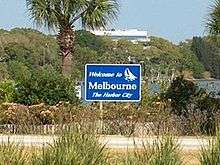
As of 2000, 90.39% of residents spoke English as their first language, while 4.69% spoke Spanish, 0.84% spoke French, 0.73% spoke German, and 0.55% spoke Arabic as their mother tongue. In total, 9.60% of the total population spoke languages other than English.[38]
Government
_001.jpg)
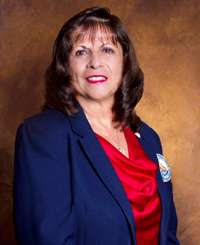
The Melbourne City Council consists of the mayor and six district council members.[39][40] Melbourne uses a Council-Manager form of government.[41]
City officials[42]
- Kathy Meehan, Mayor – Re-elected in November 2016, term expires November 2020
- Tim Thomas, District 1 Council Member – Elected in November 2016, term expires November 2020
- Mark LaRusso, District 2 Council Member – Elected in November 2018, term expires November 2022
- Yvonne Minus, District 3 Council Member – Elected in November 2016, term expires November 2020
- Debbie Thomas, Vice Mayor & District 4 Council Member – Elected in November 2014. Re-elected in November 2018, term expires November 2022
- Paul Alfrey, District 5 Council Member – Elected in November 2016, term expires November 2020
- Julie Sanders, District 6 Council Member – Elected in November 2018, term expires November 2022
The following are appointed by the council:
- City Attorney
- City Manager
Melbourne city officials created the Babcock Street Redevelopment District in 1998 to stimulate new development along Babcock Street from U.S. 1 south to U.S. 192. A 218-unit apartment complex built in 2005 is most recent step in an effort to revitalize this area.
In 2010, Melbourne began supporting the Eau Gallie Arts District as a Florida Main Street. Established in 1860 along the Indian River, the arts district (now called EGAD!) has proven to be highly successful in its redevelopment of the community of art galleries, shops, restaurants, Melbourne's first microbrewery (Intracoastal Brewing Company), and contains the city civic center and public library with a public pier, Foosaner Art Museum, FIT, Historic Rossetter House and Gardens, Pineapple Park, several businesses over 40 years old, and a community park and band shell, which is the center of many community activities.
A$180.8 million Operating and Capital Budget was passed for the 2014–15 fiscal year.[43]
In 2007, the city had a taxable real estate base of $4.96 billion.[44]
A 2011 study rated the general pension fund for city employees highly at 190%. Less favorably rated were the pension plans for fire and police employees.[45]
In 2009, the city had 870 full-time employees and 176 part-time employees.[46]
Public safety
In 2015, the city employed 168 sworn police officers, 68 support personnel, 21 part-time crossing guards, and six reserve police officers.
The city manager hires the Chief of Police. A Deputy Chief of Police oversees day-to-day operations. There are four Commanders who oversee the Patrol, Criminal Investigations, Support Services, and Special Operations divisions.
A 2009 survey indicated that the city was ranked 84 out of 400 in crime statistics, with #1 being the worst. Crimes included murder, rape, robbery, aggravated assault, burglary, and motor vehicle theft.[47]
The Commander of the Patrol Division is responsible for all patrol functions. This includes the use of the police K-9 unit.
The Criminal Investigations Division investigates major crimes, vice and narcotic crimes, and follows-up investigation of other felonies. The Division has three focused units: Criminal Investigations, Crime Scene Investigation, and Special Investigations Unit. The division includes 30 detectives and detective supervisors, five crime scene investigators, and other technical and support personnel.
The Special Operations Division encompasses the Strategic Traffic Enforcement Unit, Community Resource Officers, Community Service Officers, and all the volunteer functions.
A Commander is responsible for the Public Information Office.
The Strategic Traffic Unit consists of motor officers and aggressive driving enforcement officers who are deployed day and night.
Under the Special Operations Division, there are specialty units such as SWAT, Dive Recovery Team, Marine Patrol Unit, and the Crisis negotiation Team.
There are designated marine patrol officers who are assigned to waterway patrols. Some of the call-outs are completed in conjunction with other agencies, including the Brevard County Sheriff's Office and the Coast Guard. The Department may also be called upon to deal with homeland security issues related to the two main causeways in Melbourne, and can be involved in port and inlet security activities including the boarding of suspicious boats. Marine activities include patrols of canals in order to provide a police presence for homeowners and decrease waterfront crimes.
The Communications Center handles 130,000 calls to 9-1-1 and 1 million push-to-talk radio calls each year. Communication officers and dispatchers are the single link of our police officers and fire fighters, monitoring activities by radio and providing vital information to ensure their safety. The Communications Center receives, classifies, and prioritizes calls from the public and dispatches the calls that require police and/or fire/rescue response, and transfers and/or directs calls that do not require police response to the proper agency/unit. The Communications Center is a 24-hour operation, providing service seven days a week, including weekends and holidays.
Economy
Industry
Orlando Melbourne International Airport is located near the center of the city. Melbourne contains defense and technology companies with a high concentration of high-tech workers.[48] The following corporations have operations in Melbourne:
- DRS Technologies employed 910 workers in 2009.[49] Another reference says 1,800 workers in 2009, 1,300 in 2010.[50]
- Alstom Signaling Operations Transportation Systems
- L3Harris Technologies (corporate headquarters)
- Northrop Grumman employed 1,640 workers in 2009.[49]
- Rockwell Collins employed 1,430 in 2009.[49]
- Embraer completed a 89,000 square feet (8,300 m2) hangar and administrative office at the Melbourne Airport in February 2011.[51]
- LiveTV has its headquarters in Melbourne.[52]
- eviCore Healthcare has one of its main office in Melbourne.
- Avidyne Corporation an avionics company has their HQ in Melbourne and is a developer of Integrated Avionics Systems, multi-function displays, and traffic advisory systems for light general aviation (GA) aircraft.
Workforce
In 2007, the average size of Melbourne's labor force was 39,391. Of that group, 37,708 were employed and 1,683 were unemployed, for an unemployment rate of 4.3%.[53]
Housing
In 2008, 259 building permits were issued for 263 units. There were 209 permits issued for 320 units in 2007, which was down from 329 permits for 512 units in 2006.[54]
The median home price in 2007 was $215,000.[53]
In May 2005, the Melbourne–Titusville–Palm Bay area was among the top 20 in home price appreciation from 2003 to 2004.[55]
Competitiveness
In 2009, Forbes ranked the area 18th out of 100 Metropolitan Statistical Areas and first out of 8 metros in Florida for affordable housing, and short commute times, among others.[56]
Retail and commerce
Melbourne has two downtown business districts, a result of the merger of Eau Gallie into Melbourne:
- Downtown Eau Gallie Arts District
- Historic Downtown Melbourne – among other retail outlets, this has 26 eating and drinking establishments within a four block extent.[57]
Healthcare
The area has four hospitals, day care for senior citizens, hospice, walk-in, and urgent care facilities.[58] There is Holmes Medical Center, Palm Bay Hospital, Cape Canaveral Hospital, Rockledge Regional Medical Center and Melbourne Regional Medical Center. Kindred Hospital is a chronic care facility for ventilated patients and does not accept emergency patients. A new Viera hospital was opened in May 2011.
Tourism
The city has two golf courses. There were 96,477 rounds played in 2009–10. Revenues were $2,207,502. Rounds and revenue have been dropping since 2006. in 2011, the city raised rates for residents to the same as for non-residents, $27 per round or $522 annual fee.[59]
A monthly "Friday Fest" has been attended by 3,000 people and supported by 55 vendors.[60]
Retail
Brevard Mall, the area's first mall, was built in 1962. It was followed by Melbourne Square in 1982.
Arts and culture
Annual cultural events
In February or March:
- The Annual IndiaFest is held in February or March.[61]
- Eau Gallie Arts District Main Street hosts its annual Founders' Day on the first Saturday in February from Noon-5pm.
In April:
- The Melbourne Arts Festival, held in April, draws from 50,000–60,000 visitors [62]
In August:
- The Annual India Day is held in August.[63]
In September:
- The Melbourne Area Pilots Association hosts a General Aviation Day at Melbourne International Airport in September
In October:
- The Melbourne Main Street Fall Festival was expected to have an attendance of 30,000 in October, over two days.[60]
- The Melbourne Oktoberfest has been held each October since 1977;[64] most recently, this was held at the Wickham Park Pavilion
In December:
- Christian churches have been producing a "Bible on Parade" since 1990, each participating church portrays a book of the Bible, a spokesperson said in 2011, that it may be the only one of its kind in America [65][66]
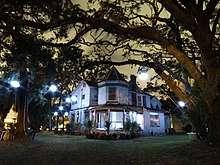
Museums and points of interest
Historic sites
There are four places on the National Register of Historic Places:[67]
- Florida Power and Light Company Ice Plant (1927) located at 1604 South Harbor City Boulevard
- William H. Gleason House at 1736 Pineapple Avenue
- James Wadsworth Rossetter House (c. 1860s) at 1320 Highland Avenue
- Green Gables at Historic Riverview Village 1501 South Harbor City Blvd
The following places also are historic:
- Henegar Center (1919) located at 625 East New Haven Avenue
- Holy Trinity Episcopal Church (1886) at 50 West Strawbridge Avenue
- Melbourne Bone Bed at Crane Creek
- Nannie Lee House – Strawberry Mansion (1905) at 1218 East New Haven Avenue
- Roesch House (c. 1901) at 1320 Highland Avenue
- Winchester Symphony House (1890s) at 1500 Highland Avenue
- Walking historic tours
EAU GALLIE Arts District has an established historical walking tour that includes over 20 historical buildings or locations in the arts district.
Museums
- Foosaner Art Museum at 1463 Highland Avenue
- Historic Rossetter House Museum at 1320 Highland Avenue
- Liberty Bell Memorial Museum at 1601 Hickory Street
- (Green Gables at Historic Riverview Village) at 1501 South Harbor City Blvd.
Performing arts
- Melbourne Civic Theater
Groups
- Brevard Symphony Orchestra
- City of Melbourne Pipes and Drums
- Strawbridge Art League and Gallery
Buildings
- Henegar Center for the Arts
- Maxwell C. King Center for the Performing Arts
- Melbourne Auditorium located on Hibiscus Boulevard
Sports
Melbourne was an official host city for the 1996 Olympic Torch Relay.[68]
There are co-ed adult and youth sports programs in flag football and ultimate frisbee.[69]
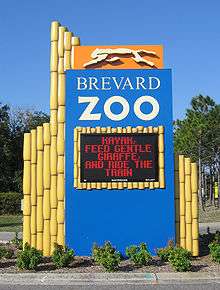
Parks, recreation, and attractions
The city of Melbourne contains over 554.72 acres (2.2 km2) of city park land, including 17 community parks,[70] 13 neighborhood parks,[71] and five smaller city parks.[72]
- Brevard Zoo
- Wickham Park
- Lake Washington
One of the many forms of recreation is local fishing in places such as Lake Washington.[73]
Education
Of all residents 25 years or older, 88.5% are high school graduates, and 25.7% have a bachelor's degree or higher.[53]
Public schools are run by the Brevard County School Board.
Prior to 1964, segregated schools were maintained for white students and black students under the doctrine of Separate but equal education. Black students were educated at Melbourne Vocational School from 1921 until it burned in 1953. For the next five years they met in the former hospital of the Naval Air Station, until Stone High School was opened in 1958. In 1964 the schools were integrated and Stone was repurposed as Stone Middle School.[74]
Colleges and universities
- Eastern Florida State College
- Everest University[75]
- Florida Institute of Technology
- Florida State University Satellite Campus
- Keiser University – Melbourne[76]
- University of Central Florida Regional Campus
- Webster University – Patrick Air Force Base Campus
Elementary schools[77]
- Roy Allen Elementary
- Ascension Catholic School
- Brevard Academy for Individual Excellence
- Dr. W. J. Creel Elementary
- Croton Elementary
- Harbor City Elementary
- Holy Trinity Episcopal Academy Lower School (Preschool – 6)
- Longleaf Elementary[78]
- Meadowlane Primary[79]
- Meadowlane Intermediate[80]
- New Covenant Christian School
- Our Lady of Lourdes Catholic School
- Quest Elementary
- Sabal Elementary
- Sherwood Elementary
- Suntree Elementary
- University Park Elementary
- West Melbourne Elementary
Middle schools
- Ascension Catholic School[81]
- Brevard Academy for Individual Excellence
- DeLaura Middle School
- Central Middle School
- Florida Preparatory Academy
- Holy Trinity Episcopal Academy Upper School
- Johnson Middle School
- Lyndon Baines Johnson Middle School
- New Covenant Christian School
- Our Lady of Lourdes Catholic School
- Stone Middle School
High schools
- Public
- Eau Gallie High School
- Melbourne High School
- Palm Bay High School
- West Shore Junior – Senior High School
- Private
- Brevard Academy for Individual Excellence
- Brevard Christian School
- Florida Preparatory Academy
- Holy Trinity Episcopal Academy Upper School
- Melbourne Central Catholic High School
- New Covenant Christian School
Adult education
- Palm Bay High Adult/Community Education
- South Area Adult Center
Media
Print
- Brevard Business News
- Florida Today – Space Coast and Central Florida
- The Crimson[82] – The Florida Institute of Technology student-run newspaper
- Town Melbourne
Radio
WFIT 89.5 FM—this radio station is an NPR station based on the grounds of Florida Institute of Technology
Television
Melbourne is part of the Orlando television market. Cable is provided by Spectrum.
Infrastructure
Transportation
Major roads
The city is responsible for about 300 miles (480 km) of road. It would like to resurface 5% (15 miles (24 km)) of that each year. It was able to afford to pave half of that in 2013.[83]
Roads in the older part of the city, in what is today the southeast, are oriented toward the north-south road, Babcock Street, with compass directions measured east and west from that road. In the same area, the east-west road, Brevard Drive, separates compass directions north and south.
All are at least four-lane roads, unless otherwise designated.










Rail
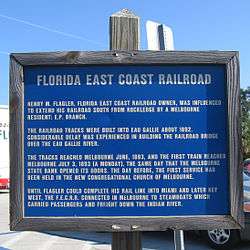
The Union Cypress Company Railroad ran east to west through south Melbourne in the early 1900s. The mill town of Hopkins was near the present-day streets of Mill Street and Main Street.
The Florida East Coast Railway runs through Melbourne, staying west of U.S. 1 through its entire run. It operated passenger service between Jacksonville and the Miami area until 1968.
Bus
- Space Coast Area Transit operates a public bus service in Melbourne and vicinity. The city subsidizes two routes internal to the city so Melbourne residents ride for free.[85]
- Greyhound Bus Lines has a bus station in Melbourne[86]
Airport
_Monument_Sign_1.jpg)
Melbourne International Airport (IATA: MLB, ICAO: KMLB, FAA LID: MLB) is located about 1.5 miles (2.4 km) northwest of the city's original business district. The airport has daily flights on six passenger airlines and a cargo one, including Delta, Delta Connection and American Eagle.
Utilities
_1.jpg)
Power is provided by Florida Power and Light. Gas is provided by Florida City Gas.
Cable TV service is provided by Spectrum.
Traditional landline telephone service is mainly provided by AT&T, while some cable customers use Spectrum digital telephone (VOIP) service.
Internet service providers in Melbourne range from various 56 kbit/s providers, AT&T (formerly BellSouth) FastAccess DSL, and Spectrum cable internet. Fiber-optic networks are installed in the city mainly for business purposes and have not been integrated for home use.
The Water Department not only provides water for the city, but for surrounding towns and cities for a premium, including Melbourne Beach, Indialantic, Indian Harbour Beach, Satellite Beach, Palm Shores, Melbourne Village, and a portion of Brevard County south of the Pineda Causeway.[87] In 2019, it served about 170,000 people.[88] Wholesale water service is provided to West Melbourne. The total distribution area is about 100 square miles (259 km2)[89] Two water treatment plants take water from Lake Washington and deep wells, providing 25,000,000 US gallons (95,000,000 litres; 21,000,000 imperial gallons) of drinking water per day. This water is treated with chloramine and ozone.[90][91] In 2003, water rates were $2.27/1,000 US gallons (3,785 l) sewer $4.47/1,000 US gallons (3,785 l).[92]
Solid waste removal and recycling is provided by Solid Waste Management, part of the city of Melbourne's Environmental Community Outreach (ECO) Division.
Namesakes
Melbourne Square, in the city of Melbourne, located on US 192 west of downtown, is the largest shopping area in Brevard County. In the 1960s, the motto of Melbourne was, "Crossroads to the Universe".
Notable people
- Marcus Maye, Professional NFL player for the New York Jets. Attended Holy Trinity
- Oliver Askew, professional IndyCar driver for Arrow McLaren SP in the 2020 IndyCar Series
- Thomas Barbour, author and naturalist, lived in Eau Gallie as a boy[93]
- Peter Blount, former member of the World Cup Bobsled Team and of the US National Track and Field Team
- Bruce Bochy, manager of the World Champion San Francisco Giants Major League Baseball team
- Robbie Carrico, Season 7 contestant on American Idol
- Bobby Dall, bass player for the band Poison, resides in Melbourne
- C.J. Hobgood, 2001 ASP world champion surfer, born in Melbourne
- Cecil Fielder, professional baseball player
- Prince Fielder, professional baseball player, son of Cecil Fielder, went to Eau Gallie High School
- William Henry Gleason, founded and lived in Eau Gallie
- Kristin Grubka, professional women's soccer player, FSU women's soccer national champion in 2014
- Damien Hobgood, professional surfer born in Melbourne
- Darrell Hammond, comedian and actor, born and resided in Melbourne from 1955 to 1975
- Devon Hughes, professional wrestler, better known as Brother Devon from Total Nonstop Action Wrestling
- Vicky Hurst, professional golfer, graduated from Holy Trinity[94]
- Zora Neale Hurston, author, lived in Eau Gallie in the 1920s and 1950s[95]
- Billy Lane, owner of Choppers, Inc. and builder of custom motorcycles
- Jeff Lett, bass player of Cartel, born in Melbourne
- Jim Morrison, lead singer for The Doors, born in Melbourne
- Henry Mucci, US Army colonel who led the Great Raid in World War II to free the Bataan survivors, retired to Melbourne
- Bill Nelson, long-time U.S. senator from Florida, raised in Melbourne[96] and graduated from Melbourne High School in 1960[97]
- Reggie Nelson, safety for NFL's Oakland Raiders
- Jamie Noble, professional wrestler[98]
- Hans von Ohain, one of the first people to develop the jet engine, retired and died in Melbourne
- Stanford Parris, former U.S. congressman from Virginia, was a primary resident of Melbourne after leaving Congress[99]
- Will Perdue, NBA forward and center (Chicago Bulls), sportscaster, born in Melbourne[100]
- Toni Pressley, professional women's soccer player, graduated from West Shore High School in 2008
- Tom Rapp, singer-songwriter, leader of 1960s/1970s band Pearls Before Swine
- Taylor Rowan, American football placekicker
- Melana Scantlin, actress
- Stefanie Scott, teenage actress born in Melbourne, stars on the Disney show A.N.T. Farm
- Lee Stange, professional baseball pitcher[101]
- Jason Steele, state representative from 1980 to 1982
- Amber Torrealba, professional skimboarder
- George Trofimoff, former U.S. Army colonel and convicted spy for the Soviet Union, lived in Melbourne from 1994 to 2000
- Robbin Thompson, singer-songwriter
- Kate Upton, model, 2012 Sports Illustrated swimsuit issue cover girl
- Tim Wakefield, baseball pitcher for the (Boston Red Sox), born in Melbourne
- Matt Walters, defensive end for the New York Jets
- Leonard Weaver, National Football League fullback
- Larry Wolfe, Major League Baseball infielder
Notes
- City logo
- Raley, Karen and Raley Flotte, Ann, Images of America Melbourne and Eau Gallie
- "2019 U.S. Gazetteer Files". United States Census Bureau. Retrieved July 2, 2020.
- "Profile of General Population and Housing Characteristics: 2010 Demographic Profile Data (DP-1): Melbourne city, Florida". United States Census Bureau. Retrieved January 30, 2012.
- "Population and Housing Unit Estimates". United States Census Bureau. May 24, 2020. Retrieved May 27, 2020.
- "U.S. Census website". United States Census Bureau. Retrieved January 31, 2008.
- "US Board on Geographic Names". United States Geological Survey. October 25, 2007. Retrieved January 31, 2008.
- "Annual Estimates of the population for the Incorporated Places of Florida". US Census Bureau. Archived from the original (CSV) on July 23, 2009. Retrieved June 23, 2009.
- "City of Melbourne, FL : Historic Preservation". Retrieved October 8, 2016.
- Purdy:23
- Purdy:23-29
- Shofner, Jerrell H., History of Brevard County Volume 1
- Jones, Teri (February 21, 2016). "Remember Melbourne's black history". Retrieved December 18, 2018.
- Kennerly, Britt (January 10, 2011). "Freed slaves helped map out local history". Florida Today. Melbourne, Florida. pp. 1A.
- "Historic Preservation | City of Melbourne, FL". www.melbourneflorida.org.
- Kellersberger, Julia Lake. Rooted in Florida Soil, Florida Institute of Technology Press, 1971, p. 12.
- Neale, Rick (March 1, 2010). "Church has 125 reasons to smile". Melbourne, Florida: Florida Today. pp. 9A. Archived from the original on February 22, 2014.
- Price, Wayne (March 22, 2009). "70 years & counting". Melbourne, Florida: Florida Today. pp. 1E.
- Sonnenberg, Maria (November 9, 2013). "Historic preservation". Florida Today. Melbourne, Florida. pp. 5D.
- "History of Melbourne Harbor Marina in Melbourne, Florida". www.melbourneharbor.com. Retrieved August 11, 2017.
- Brotenarkle, Ben (March 25, 2014). "Historian publishes collection of articles". Florida Today. Melbourne, Florida. pp. 11A. Retrieved March 25, 2014.
- Kennerly, Britt (March 20, 2016). "Space, Race and War". Florida Today. Melbourne, Florida. pp. 18A. Retrieved March 20, 2016.
- "The History of Melbourne Florida". Archived from the original on May 24, 2007. Retrieved August 11, 2017.
- Arbogast, Mickey (February 2, 2015). "Veteran recalls days of 1950s Melbourne". Florida Today. Melbourne, Florida. pp. 9A. Retrieved May 3, 2015.
- Thomas, Frank J. (2017). "One or ten? The 1967 Battle over unification/consolidation in South Brevard". The Journal of the Brevard County Historical Commission. XVI (2): 25–31.
- Bayley, Barbara (November 8, 2014). "New Englander is now 'so Brevard'". Florida Today. Melbourne, Florida. pp. 13A. Retrieved February 1, 2016.
- Florida Today Newspaper April 29, 1970
- Gallop, J.D. (March 21, 2016). "Tension, progress in race relations". Florida Today. Melbourne, Florida. pp. 5D. Retrieved March 21, 2016.
- James, Elliott (August 29, 2017). "Region not built for Harvey-style rainfall". Florida Today. Melbourne, Florida. pp. 8A. Retrieved August 30, 2017.
- Cervenra, Susanne (January 13, 2010). "Melbourne council suspends gated street events". Florida Today. Melbourne, Florida. pp. 1B.
- "Cheering Supporters Greet Trump at Rally in Florida". VOA News. February 18, 2017.
- "Geographic Identifiers: 2010 Demographic Profile Data (G001): Melbourne city, Florida". United States Census Bureau. Retrieved January 30, 2012.
- "Tropical Storm Fay continues to drift west". Florida Today. Florida Today. August 21, 2008. Archived from the original on June 6, 2011.
- "Cold Temperatures and Snow Flurries in East-Central Florida - January 24, 2003" (PDF). weather.gov.
- "NowData – NOAA Online Weather Data". National Oceanic and Atmospheric Administration. Retrieved June 7, 2013.
- Neale, Rick (March 27, 2013). "Ordinance regulates fertilizer use". Florida Today. Melbourne, Florida. pp. 1B.
- "Census of Population and Housing". Census.gov. Retrieved June 4, 2015.
- "Data Center Results". www.mla.org. Retrieved August 11, 2017.
- "Map of City Council Districts – City of Melbourne, Florida". Archived from the original on October 12, 2007. Retrieved August 11, 2017.
- "Melbourne City Council Members – City of Melbourne, Florida". Archived from the original on October 12, 2007. Retrieved August 11, 2017.
- "Council-Manager Form of Government – City of Melbourne, Florida". Archived from the original on October 10, 2007. Retrieved August 11, 2017.
- "Archived copy" (PDF). Archived from the original (PDF) on February 16, 2008. Retrieved November 13, 2007.CS1 maint: archived copy as title (link)
- "Budget - City of Melbourne, FL". www.melbourneflorida.org. Retrieved August 11, 2017.
- Dean, James (April 26, 2008). "More taxes or fewer services". Florida Today.
- Walker, Don (November 11, 2011). "Cities pensions among the best, bottom". Florida Today. Melbourne, Florida. pp. 4B.
- "Information about the City of Melbourne, Florida". City of Melbourne, Florida. October 24, 2010. Archived from the original on February 16, 2007.
- Moody, R. Norman (November 28, 2009). "Brevard crime up, down". Florida Today. Melbourne, Florida. pp. 5B.
- U.S. Department of Labor, Bureau of Labor Statistics. “Metro areas with highest percentages of high-tech workers”. Bureau of Labor Statistics website, August 25, 2003. Accessed October 23, 2007.
- "Brevard County School Budget 2009:General information" (PDF).
- Peterson, Patrick (December 20, 2010). "DRS opens new, expanded offices". Melbourne, Florida: Florida Today. p. 20A.
- Price, Wayne T. (November 5, 2010). "Embraer facility nearly done". Melbourne, Florida: Florida Today. p. 6C.
- "Where we are." LiveTV. Retrieved on January 19, 2010.
- Melbourne Community Data Sheet Economic Development Council of Florida's Space Coast. Retrieved on July 23, 2009.
- Building Permits Archived June 15, 2009, at the Wayback Machine United States Census Bureau. Retrieved on July 23, 2009.
- Steve Kerch. "Home prices up 11% in fourth quarter". MarketWatch.
- Price, Wayne T. (November 8, 2009). "Forbes: Brevard's got bang for buck". Florida Today. Melbourne, Florida. pp. 1A.
- Cervenka, Susanne (April 24, 2011). "Downtown Identity". Florida Today. Melbourne, Florida. pp. 1E.
- "Community Links - City of Melbourne, Florida". Archived from the original on November 3, 2007. Retrieved August 11, 2017.
- Cervenka, Susanne (March 31, 2011). "Residents lose discount on golf". Florida Today. Melbourne, Florida. pp. 1A.
- Sonnenberg, Maria (September 18, 2013). "A fest for the entire family:Thousands attend free monthly festival in Melbourne". Florida Today. Melbourne, Florida. pp. 1G. Retrieved September 19, 2013.
- "Indiafest 2019 - Home". www.indiafestbrevard.org.
- Best, Keilani (March 6, 2010). "Festivals boost economy". Melbourne, Florida: Florida Today. p. 7C. Archived from the original on July 1, 2014.
- "India Day 2013". Brevard County Events. Archived from the original on July 22, 2015. Retrieved January 24, 2019.
- Megan Downs (October 18, 2008). "Festival gets mixed reviews". Florida Today.
- Courbat, Cindi (December 4, 2011). "Parade gives meaning to season". Florida Today. Melbourne, Florida. p. 1B.
- "Bible on Parade". Jesus is the Key.
- "National Register of Historical Places - FLORIDA (FL), Brevard County". www.nationalregisterofhistoricplaces.com. Retrieved August 11, 2017.
- "Information about the City of Melbourne, Florida". Archived from the original on February 16, 2007.
- "American Sports League". Archived from the original on May 22, 2013. Retrieved August 11, 2017.
- "Community Parks - Parks Division - City of Melbourne, Florida". Archived from the original on December 18, 2007.
- "Neighborhood Parks - Parks Division - City of Melbourne, Florida". Archived from the original on October 18, 2007. Retrieved August 11, 2017.
- "Other Parks - Parks Division - City of Melbourne, Florida". Archived from the original on October 18, 2007. Retrieved August 11, 2017.
- "Brevard County Lake Washington Park". www.brevardcounty.us. Retrieved July 29, 2016.
- McCarthy, Kevin (2007). African American Sites in Florida. Pineapple Press, inc. p. 18. ISBN 9781561643851.
- "Altierus [Previously Everest] - Earn Your Diploma or Degree". www.everest.edu. Retrieved August 11, 2017.
- "Keiser University". Keiser University. Retrieved August 11, 2017.
- "Schools Listing". Archived from the original on November 10, 2007. Retrieved August 11, 2017.
- "Longleaf Elementary School". Retrieved March 23, 2019.
- "Meadowlane Primary Elementary School". Retrieved August 11, 2017.
- "Meadowlane Intermediate Elementary School". Retrieved August 11, 2017.
- "Ascension Catholic School – Catholic Community in Melbourne Florida". www.ascensioncatholicsch.org. Retrieved August 11, 2017.
- "The Florida Tech Crimson". Archived from the original on January 10, 2016. Retrieved August 11, 2017.
- Gunnerson, Scott (December 29, 2013). "Road work falls miles behind". Florida Today. Melbourne, Florida. pp. 3A. Retrieved December 29, 2013.
- Neale, Rick (February 2010). "box:System reduces Wickham delays". Florida Today. Melbourne, Florida. pp. 3A. Archived from the original on July 1, 2014.
- Space Coast Area Transit official website Archived July 15, 2011, at the Wayback Machine
- "Information about Melbourne Greyhound station". Retrieved August 11, 2017.
- Neale, Rick (January 23, 2019). "Melbourne City Council to host debate on fluoridation". Florida Today. Melbourne, Florida. pp. 9A. Retrieved January 23, 2019.
- Rick Neale (September 28, 2016). "Melbourne boil water notice to remain in effect for 2 days". Florida Today. Florida Today. Retrieved September 28, 2016.
- Melbourne Water Supply Archived July 25, 2008, at the Wayback Machine retrieved June 9, 2008
- Melbourne's Water Supply Archived January 28, 2012, at the Wayback Machine retrieved November 18, 2011
- 2011 City of Melbourne - Annual Drinking Water Quality Report. Melbourne, Florida: City of Melbourne, Florida. 2011. ISBN 978-0-06-621330-9.
- "Florida Water Rates Evaluation of Single-Family Homes" (PDF). Archived from the original (PDF) on April 29, 2016. Retrieved August 11, 2017.
- Bowe Gardeners. A Tribute to Thomas Barbour (1884–1946) memorial dated 1976 located in Ballard Park, Melbourne, Florida.
- Cherry, Mike (December 25, 2009). "Herschel & Hurst". Florida Today. Melbourne, Florida. p. 3C. Archived from the original on July 1, 2014.
- Zora Neale Hurston Digital Archive @ University of Florida Archived October 27, 2010, at the Wayback Machine retrieved February 10, 2011
- Leary, Alex. "On the run with Sen. Bill Nelson, no signs of slowing down". Tampa Bay Times. Retrieved December 8, 2017.
- Biographical Dictionary of the United States Congress – NELSON, Clarence William (Bill), (1942-) retrieved February 10, 2011
- "From small town to big time " Sports " The Register-Herald, Beckley, West Virginia". Retrieved August 11, 2017.
- Schapiro, Jeff (March 27, 2010). "Former six-term Rep. Stanford E. Parris dies at 80". Richmond Times-Dispatch. Retrieved March 28, 2010.
- "Will Perdue Stats - Basketball-Reference.com". Basketball-Reference.com. Retrieved August 11, 2017.
- "Lee Stange - Society for American Baseball Research". sabr.org. Retrieved August 11, 2017.
References
- Purdy, Barbara A. (2008). Florida's People During the Last Ice Age. University Press of Florida. ISBN 978-0-8130-3204-7
External links
| Wikimedia Commons has media related to Melbourne, Florida. |

- Official website
_1.jpg)
